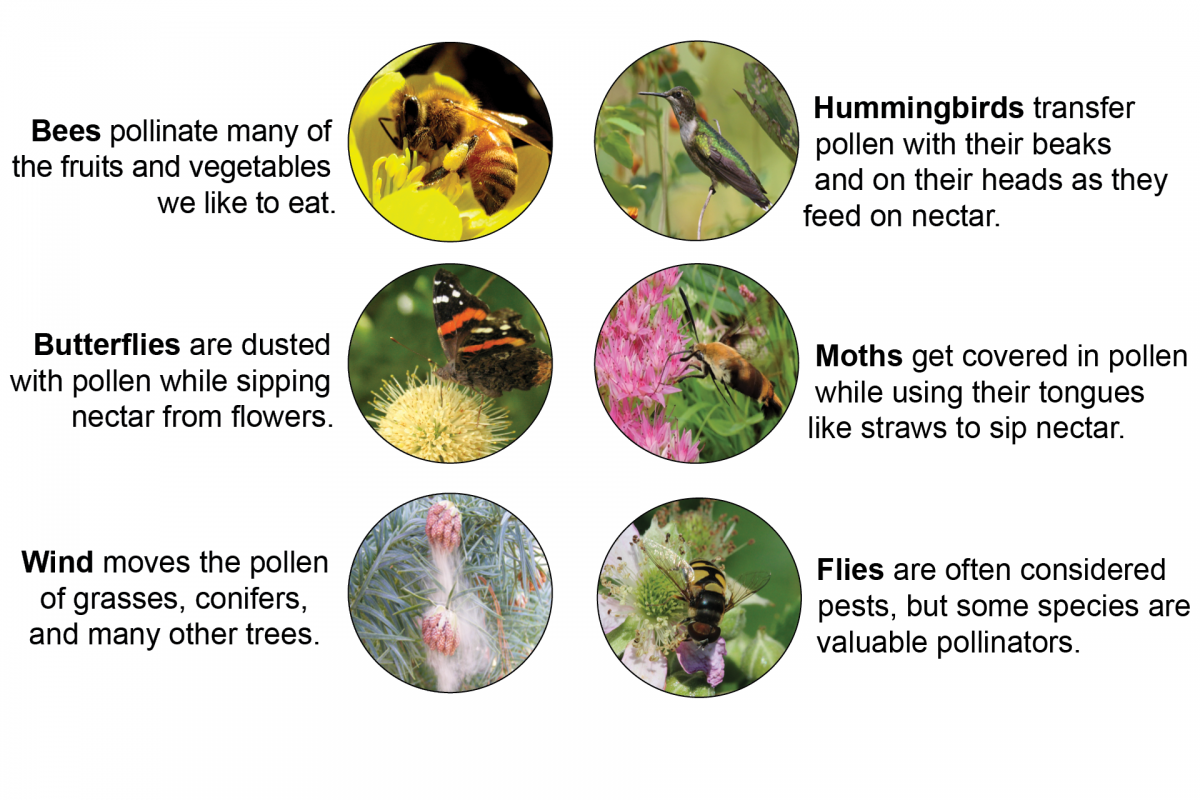
Pollinators of the Palouse

What is Pollination?
Pollination is the act of transferring pollen grains from the male anther of a flower to the female stigma. The goal of every living organism, including plants, is to create offspring for the next generation. One of the ways that plants can produce offspring is by making seeds.
Who are the Pollinators?
Pollinators are a group of animals that move from plant to plant while searching for protein-rich pollen or high energy nectar to eat. As they go, they are dusted by pollen and move it to the next flower, fertilizing the plant and allowing it to reproduce and form seeds, berries, fruits and other plant foods that form the foundation of the food chain for other species including humans.They all play a crucial role in plant reproduction and our ecosystem.
Pollinators are themselves an important food source for other wildlife. Countless birds, mammals, reptiles and amphibians eat the protein and fat-rich eggs, larvae, or adult forms of pollinators, or feed them to their young. Pollinators play a critical role in the food supply for wildlife and people. But pollinators worldwide are in trouble and are declining.
“If the bee disappeared off the surface of the globe, then man would have only four years of life left. No more bees, no more pollination, no more plants, no more animals, no more man.”
-Albert Einstein
Filmmaker Louie Schwartzberg shows us the intricate world of pollen and pollinators with gorgeous high-speed images from his film "Wings of Life," inspired by the vanishing of one of nature's primary pollinators, the honeybee.
Rock Lake Conservation District Homestead seed mix
Homestead Native Pollinator Mix – ½ pound
LOT: SPO24-0853 Germ Origin
19.85% Rocky Mt Beepland 93% UT
19.64% Blanketflower 83% IND
13.98% Arrowleaf Balsamroot 96% UT
13.,96% Pale Purple Coneflower 93% OR
9.72% Silvery Lupine 88% WA
9.79% Palmer Penstemon 87% UT
7.25% Fernleaf Biscuitroot 91% MT
3.46% Silky Lupine 94% ID
2.97% Desert Globemallow 86% UT
2.90% Sulfur Flower Buckwheat 77% UT
2.46% Showy Milkweed 84% ID
0.92% Oregon Sunshine 93% OR
0.44% Western Yarrow 88% UT
Crop Seed 0.02% Test Date 9/24 AMS 667
Inert Matter 2.34% Seeds, Inc./Plants of the Wild
Weed Seed 0.02% (no noxious) www.plantsofthewild.com
Seeding Instructions
*For best results eliminate as many broadleaf and grassy weeds as possible from your site by hand, tilling, or with a proper herbicide.
*Level and shape the site to the desired look. Roll or pack the soil, then lightly rake the soil surface to create a seed bed.
*Broadcast seed over the site evenly either by hand or with a spreader.
*Lightly rake the seed into the soil no more than 1/4” deep or cover it with natural fiber mulch to enhance moisture retention and germination.
*Keep soil moist until plants are established
*Ideal planting time is in spring or fall. Summer seeding is recommended only on sites with irrigation.






